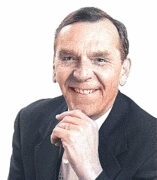
John Morrison
Emeritus Professor (In Memoriam)
About
Our work is focused on three types of compounds: the chemistry of the electron deficient polyboron halides, the preparation of trifluoromethyl containing main group and transition metal derivatives, and an examination of the reactivity of alkylated high valent main group species.
In the first area, we are in the process of comparing the properties of neutral cluster haloboranes (like B10Cl10) with those of the well known dianions, e.g., B10Cl102-. The insert compares the relative energies and degeneracies of the 11 framework orbitals of the D4d B10Cl102- ion with those of a neutral C3v B10Cl10 species. The neutral boranes are of interest because they form one of the only known series of polyhedral compounds that have only 2n framework electrons rather than the 2n+2 generally envisioned by Wade's rules.
In the second area, we have recently generated compounds like Sb(CF3)5, the first compound with more than four CF3 groups attached to the central atom, and CpMo(NO)2CF3, the latter for comparison to related alkyl and trifluoromethyl species.
In addition, we are currently improving the methodology for the preparation of this type of compound by developing superior transfer reagents.
Finally, we are interested in the chemistry of compounds like Te(CH3)6 which we were the first to prepare. At the present time, virtually nothing is known about the chemistry of high valent main group species of this type and we would like to determine which derivatives can be prepared, their properties, and how thermally stable they are.
Education
BS, University of California, Berkeley, 1964
PhD, University of Maryland, 1972
Postdoctoral Fellow, Massachusetts Institute of Technology, 1972-1976
Visiting Scholar, Harvard University, 1987